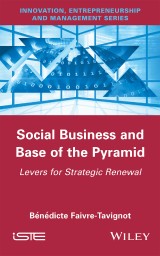Details

Social Business and Base of the Pyramid
Levers for Strategic Renewal1. Aufl.
|
139,99 € |
|
| Verlag: | Wiley |
| Format: | |
| Veröffentl.: | 15.12.2015 |
| ISBN/EAN: | 9781119261186 |
| Sprache: | englisch |
| Anzahl Seiten: | 382 |
DRM-geschütztes eBook, Sie benötigen z.B. Adobe Digital Editions und eine Adobe ID zum Lesen.
Beschreibungen
<p>This book analyzes how social business and base of the pyramid approaches allow companies to reinvent themselves, or in other words how they are the levers for strategic renewal.</p> <p>It highlights the constraints and possible difficulties encountered in the process of corporate renewal, drawing on individual and collective restraints to outline the key themes for a company’s successful transition.</p> <p>The author uses the case of Danone to explain how such a process of strategic renewal can take time and calls for a shared vision not only among the directors but between all the players, with a strong emphasis on long-term commitment.</p> <p>Throughout this book, the author offers guidance to help others complete this process with success, encouraging the reader to seize opportunities for change.</p>
<p>Foreword ix</p> <p>Preface xi</p> <p>Introduction xiii</p> <p><b>Part 1. Review of Publications 1</b></p> <p>Chapter 1. From CSR to Business Models of Access to Goods and Services for All 3</p> <p>1.1. Corporate social responsibility (CSR) 3</p> <p>1.1.1. Origins and definitions 4</p> <p>1.1.2. The question “why?”: why should businesses adopt socially responsible behavior? 6</p> <p>1.1.3. The question of “how?”: how can businesses implement socially responsible behavior? 21</p> <p>1.1.4. Are we heading toward CSR 2.0? 26</p> <p>1.2. Social models providing access for all – BOP/social business 31</p> <p>1.2.1. Introduction to poverty and market approaches 31</p> <p>1.2.2. The set of BOP themes 33</p> <p>1.2.3. The set of themes within social business 57</p> <p>1.2.4. Conclusion of the review of publications on CSR/BOP/social business 60</p> <p><b>Chapter 2. Strategic Renewal 63</b></p> <p>2.1. Definitions and issues 64</p> <p>2.1.1. Incremental change vs. radical change 64</p> <p>2.1.2. Intentional change vs. unintentional change 65</p> <p>2.1.3. Cognition vs. action 65</p> <p>2.2. Barriers to strategic renewal 66</p> <p>2.3. Determinants of strategic renewal 66</p> <p>2.4. Link between organizational learning and strategic renewal 67</p> <p>2.5. Conclusion of the strategic renewal literature review 74</p> <p><b>Chapter 3. Individual Competencies to Organizational Competencies 75</b></p> <p>3.1. Theoretical analysis of the linkage of individual, group and organizational competencies 76</p> <p>3.2. Empirical analysis of the linkage of individual, group, and organizational competencies 78</p> <p>3.3. Conclusion of the literature study on competencies 78</p> <p>Conclusion to Part 1 79</p> <p><b>Part 2. Empirical Part of the Research 87</b></p> <p><b>Chapter 4. Methodological Characteristics of the Empirical Study 89</b></p> <p>4.1. Qualitative research methodology of exploratory nature 89</p> <p>4.1.1. Research of exploratory nature 89</p> <p>4.1.2. Qualitative research 90</p> <p>4.2. General research design 91</p> <p>4.2.1. Identification of the case 92</p> <p>4.2.2. Selection of projects studied at Danone and identification criteria 101</p> <p>4.2.3. Delimitation of the study period 105</p> <p>4.2.4. Interviews 105</p> <p>4.2.5. Selection of interviewees 105</p> <p>4.2.6. Other sources of information 109</p> <p><b>Chapter 5. Analysis of the Danone Case: Illustration of the Strategic Renewal Process Based on the SBOP Projects 113</b></p> <p>5.1. The individual 114</p> <p>5.1.1. Intuitions 114</p> <p>5.1.2. Acquisition of individual competencies 128</p> <p>5.1.3. Conclusion of the first level: the individual 169</p> <p>5.2. The group 169</p> <p>5.2.1. Interpretation and integration 169</p> <p>5.2.2. Acquisition of collective skills 203</p> <p>5.2.3. Conclusion of the second level: the group 230</p> <p>5.3. The organization 231</p> <p>5.3.1. Institutionalization 231</p> <p>5.3.2. Acquisition of organizational competencies 267</p> <p>5.3.3. Analysis of the blocks and levers of the institutionalization and the development of organizational competencies 281</p> <p>5.3.4. Conclusion of the third level: the organization 283</p> <p><b>Chapter 6. Analysing Other Cases: Schneider, Renault, Essilor, Bouygues and Bel 287</b></p> <p>6.1. Schneider Electric 287</p> <p>6.1.1. 4I processes 288</p> <p>6.1.2. Developing new competencies: individual, collective and organizational 292</p> <p>6.1.3. Limits and prospects 293</p> <p>6.2. Renault 294</p> <p>6.2.1. 4I processes 294</p> <p>6.2.2. Developing new competencies: individual, collective and organizational 297</p> <p>6.2.3. Limits and prospects 298</p> <p>6.3. Essilor 299</p> <p>6.3.1. 4I processes 299</p> <p>6.3.2. Developing new skills: individual and shared 304</p> <p>6.3.3. Limits and prospects 305</p> <p>6.4. BEL 305</p> <p>6.4.1. 4I processes 306</p> <p>6.4.2. Developing new competencies: individual and collective 309</p> <p>6.4.3. Limits and horizons 309</p> <p><b>Part 3. Discussion 311</b></p> <p><b>Chapter 7. Theoretical Contributions 313</b></p> <p>7.1. Managerial contributions 313</p> <p>7.1.1. Managerial contributions for Danone 313</p> <p>7.1.2. Managerial contributions for Schneider, Renault, Essilor and Bel 315</p> <p>7.1.3. Managerial contributions for other businesses 317</p> <p>7.1.4. Summary of this research’s contributions to management 320</p> <p>7.2. Humanist contributions 320</p> <p>7.2.1. Development of poor countries and the role of multinational businesses 321</p> <p>7.2.2. The business’s goal and the reconciliation of societal and economic dimensions 323</p> <p>7.2.3. Relationship to reality 326</p> <p>7.2.4. Summary of humanist contributions 327</p> <p>7.3. Limitations 328</p> <p>7.3.1. The decision to focus on an SBOP body 328</p> <p>7.3.2. The timespan of the analysis 328</p> <p>7.3.3. The author’s involvement in SBOP approaches 328</p> <p>7.3.4. Research perspectives 329</p> <p>Conclusion 331</p> <p>Appendix 335</p> <p>Bibliography 347</p> <p>Index 353</p>
<p><b>Bénédicte Faivre-Tavignot</b> is Affiliate Professor in strategy at HEC Paris in France. She is co-founder and Executive Director of the Social Business Chair and Executive Director of the Society and Organizations Center.</p>
Diese Produkte könnten Sie auch interessieren:

Counterparty Credit Risk, Collateral and Funding

von: Damiano Brigo, Massimo Morini, Andrea Pallavicini

69,99 €
















